7 Ways to Apologize to a Friend in a Meaningful Way
When you have any kind of lasting relationship with another person, you’re bound to wrong each other at some point. After you wrong somebody, an apology is in order. However, apologizing is not an easy task — it leaves you in a vulnerable position where you’re taking the blame for something. Failing to apologize in a satisfactory manner, though, may negatively impact your relationships and make it hard for people to get along with you.
5-Minute Crafts has prepared a short guide outlining all the elements that a satisfactory apology should have, to help you properly communicate that you’re sorry.
1. Give yourself some affirmations before you apologize.
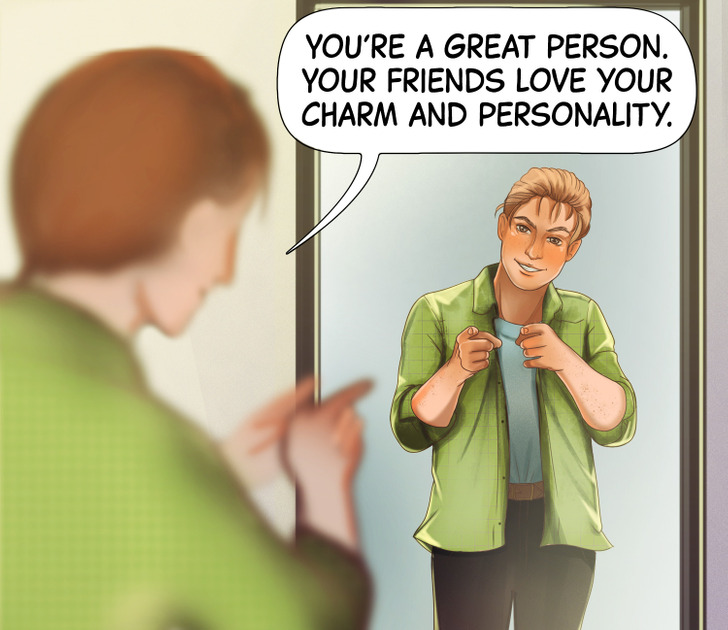
While it may sound irrelevant at first, talking to yourself in a positive light before apologizing will actually make you better at it. Apologizing is not an easy thing to do and it will put you in a very stressful position, but practicing self-affirmations will improve your self-esteem and confidence. This will, in turn, reduce your anxiety and help you make your apologies come across as more genuine.
An effective way to do this is to think about your own sources of self-worth. Think about your strengths and remind yourself of some of the better things about you. The positive reaffirmations will make you put your guard down, which will make your apology sound less like a defense and more like an honest admission of a mistake.
2. Identify why you are apologizing.
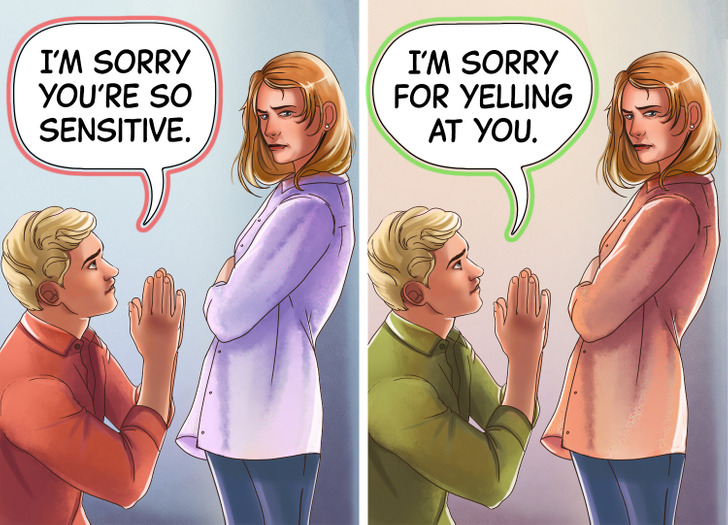
The person you are apologizing to will most likely know why you are apologizing, but it is still important to directly address it in your apology. The main reason behind doing this is that it shows that you not only understand you did something wrong, but you also understand what you did wrong.
If you don’t address why you are apologizing, you may end up—perhaps inadvertently—shifting the blame onto the other person. Instead of saying something vague like, “I’m sorry you got offended,” properly claim ownership of the hurt you’ve caused and say something along the lines of, “I’m sorry I yelled at you the other day.”
3. Admit any wrongdoing and take responsibility for your actions.
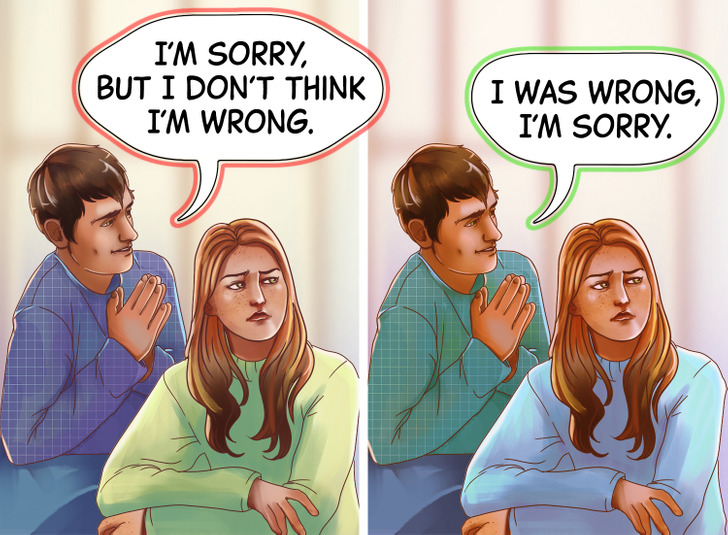
Adding a sentence as simple as, “I was wrong,” to your apology will make it more complete, since this is an explicit admission of fault that will let the other person know that you’re taking responsibility for your actions.
It’s always important to apologize, even if the entire conflict wasn’t your fault. When you apologize, though, you should take responsibility for only your side of the conflict, not the entirety of it. Apologizing and taking responsibility for your wrongdoings is a healthy thing that will improve your relationship —you get to learn which actions you’ll end up regretting, as well as establish your own boundaries in the process.
4. Acknowledge the other person’s feelings.
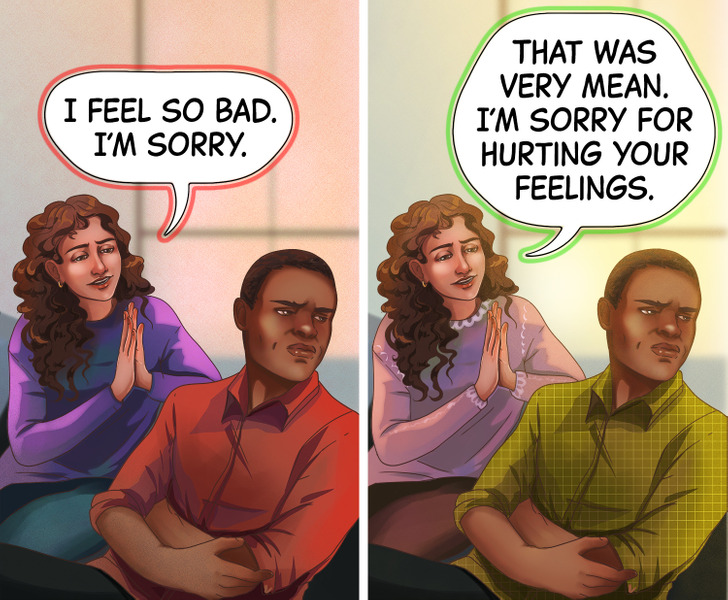
Putting yourself in the other person’s shoes is the key ingredient to a good apology. By acknowledging their feelings as legitimate, you show that you also understand the way you made them feel and how your actions have impacted them. Sometimes the way you act wouldn’t have hurt you, but what matters is that you’ve hurt someone else, and you should acknowledge that.
A good way to do this is to simply verbalize the fact that you acknowledge the way they feel by saying something like, “I’m sorry for forgetting about your birthday, I know it made you feel like I don’t care about you.” Keep in mind, however, that part of acknowledging the other person’s feelings also means that you can’t control their response or if they are ready to forgive you or not.
5. Express regret in your apology.
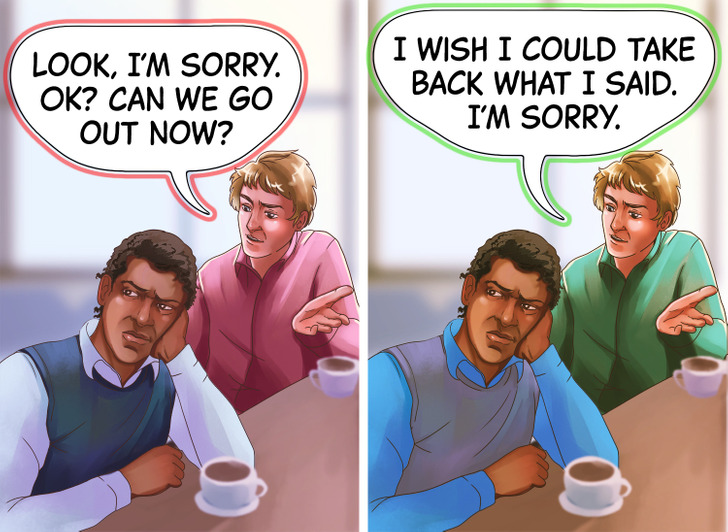
Besides taking responsibility and acknowledging the other person’s feelings, it’s also important to communicate to the other person that you feel bad about your actions. By doing so you are making your apology more heartfelt as well as ultimately letting them know that you care about them.
Some things that you can say to express regret and remorse in your previous actions include sentences along the lines of, “I wish I could take it back,” or “I regret not thinking about how you would feel.”
6. Say that you are sorry and ask for forgiveness.
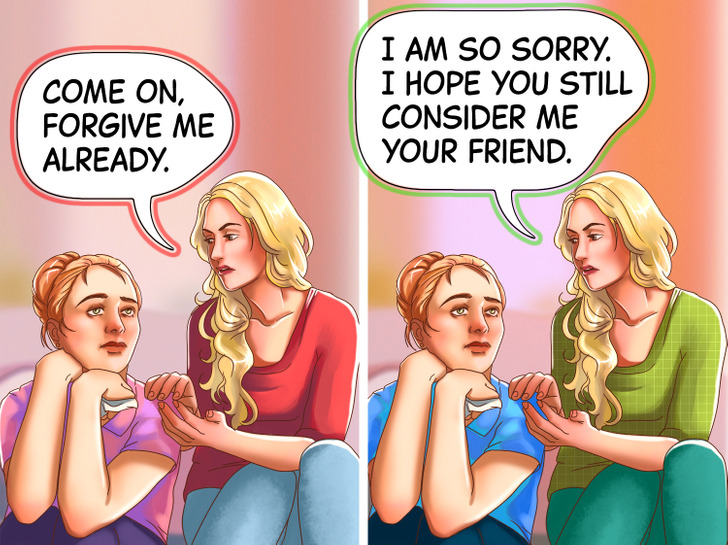
It may seem obvious, but uttering the words, “I’m sorry” matters when you are apologizing. Remember, an apology is not a debate—it is not the time to dispute or argue against the reaction of the other person. The recommended thing to do is to simply say that you’re sorry, without adding words such as “but” or “if.”
Formally asking for forgiveness is another step you can take to show that your relationship matters. Saying something like “Is there anything I can do to make it right?” or simply “I hope you can forgive me and still consider me your friend,” allows the other person to recognize that you also need to be forgiven.
7. Show that you are sorry.
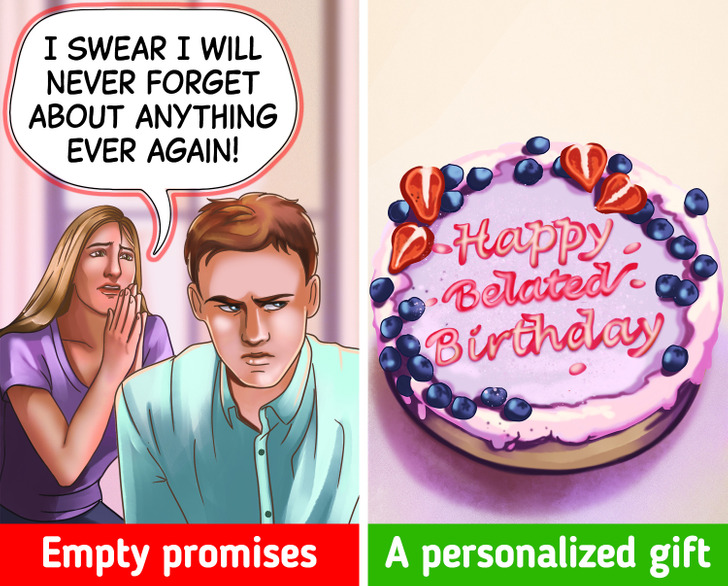
An important part of apologizing is what happens after you say you’re sorry. A good way of showing that you’re sorry is by making amends whenever possible—replacing any material items that you broke or promising to not make the same mistake again, for example. Another thing you can do is to make it up to them with a personalized gesture or gift that they will value. Be careful with token gestures or empty promises when apologizing, as they will only deteriorate the relationship further.
Additional tips

Showing that you’re aware of your wrongdoings and that you’re taking responsibility for them, acknowledging the other person’s feelings, and expressing regret are all integral parts of a good apology, but there are other things that you should also take into consideration:
- If possible, it’s better to apologize in person rather than do it in writing.
- Find the right time for your apology. Don’t wait too long to apologize, but be careful about apologizing too soon—give the other person time to process first.
- Try to match the other’s person apology language as much as possible. Some people need to feel more validated in their feelings, while others will need you to take responsibility. When possible, apologize in a way that matters the most to the other person.

CLICK to join a new online writing course given by the 5-Minute Crafts team!